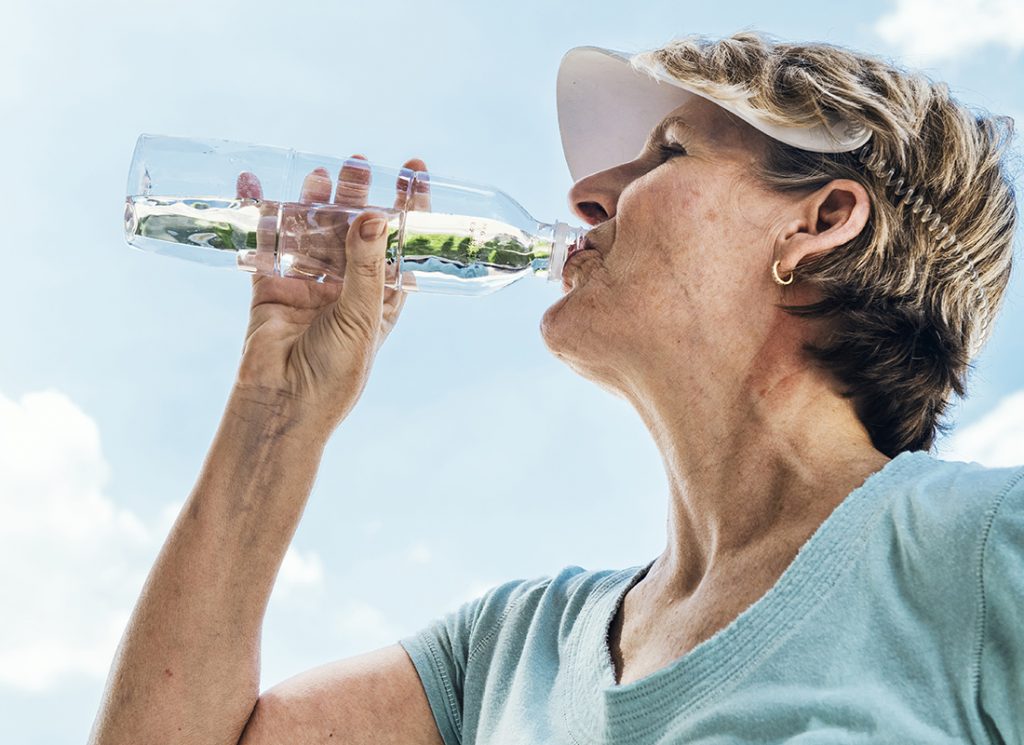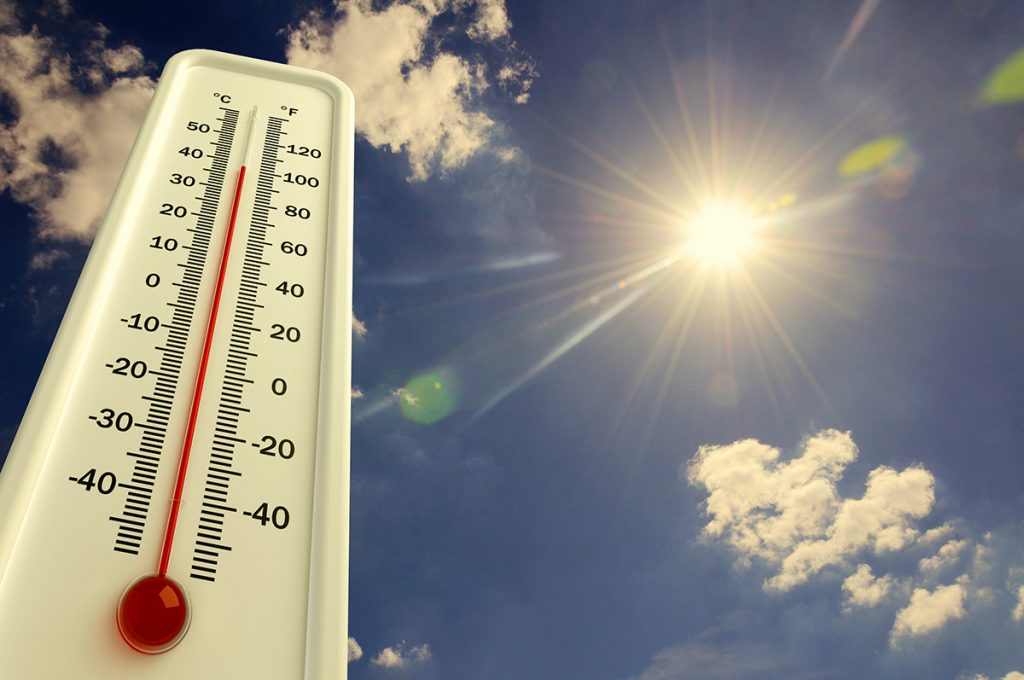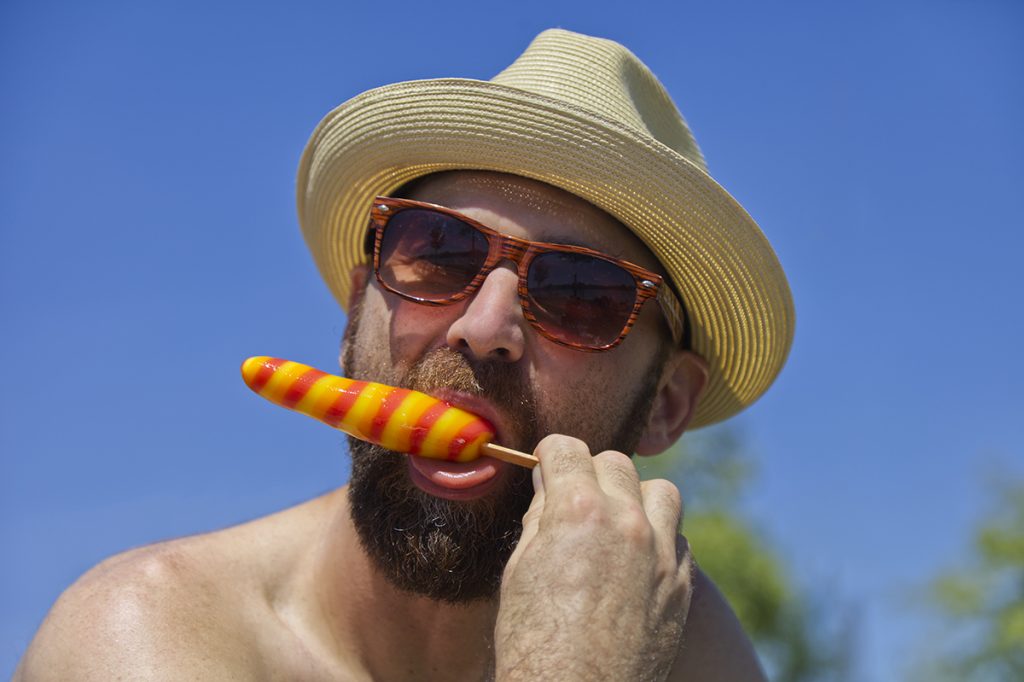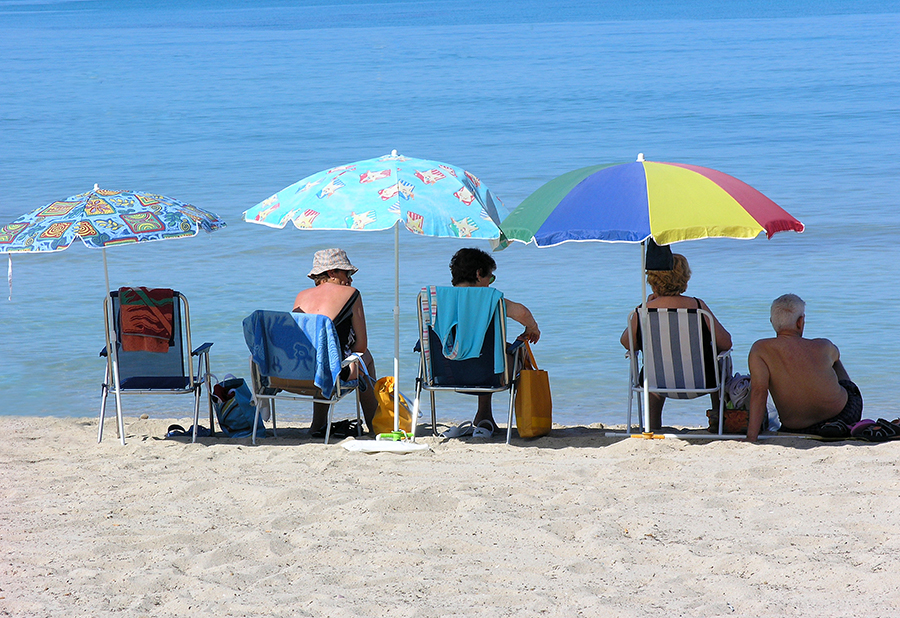Summer Heat is Here! Keep Cool.
A healthy body temperature is maintained by sweating. Older adults do not sweat easily due to some health conditions. So they are at greater risk for heat-related illnesses like these when the temperatures rise:
- Heat rash or muscle cramps
- Swelling in the legs and hands
- Hyperventilation, heat stress and fainting
- Heat exhaustion or heatstroke (sunstroke)
To beat the heat of a St. Louis summer:
- Spend time indoors in cool, air-conditioned areas and reduce outdoor physical activity, particularly in the hottest afternoon hours.
- Eat small, balanced meals throughout the day to maintain energy
- Avoid dehydration. Drink plenty of water. Avoid beverages that contain caffeine and alcohol
- Wear loose-fitting, lightweight clothing. Wear a wide-brimmed hat and sunglasses outdoors to cover your head, eyes and neck.
- Use sunscreen to prevent sunburn. A sunburn makes it hard for your skin to cool itself. Use a broad-spectrum sunscreen with an SPF of at least 15. Apply sunscreen generously and re-apply every two hours, or more often if you’re swimming or sweating.
You May Be At Risk
Seniors and those with chronic medical conditions often have difficulty regulating their body temperature. This is due to medical conditions and prescription medicines that make it more difficult to keep cool. It’s important to take proper heat illness precautions during the summer heat, especially for children under the age of 4 and older adults over the age of 65.
Your Body Temperature
Your body’s heat combined with environmental heat results is called your “core temperature”. Your body needs to regulate the heat gain (and, in cold weather, heat loss) from the environment to maintain a core temperature that’s normal, approximately 98.6 F (37 C).
Heat Index
Heat illness occurs when your body can’t keep itself cool. As the temperature rises, your body produces sweat to stay cool. The heat index measures the air temperature plus the effects of humidity. If the temperature is 90 degrees, for instance, and the relative humidity is 70%, the air feels as though it’s 106 degrees. High humidity makes it harder for sweat to evaporate from the body. When your body can’t cool, your body temperature rises and you can become ill.
Heat Illness Is Real
- Heat Cramps: Heat cramps are the mildest form of heat illness and consist of painful muscle cramps and spasms that occur during or after intense exercise and sweating in high heat. Try to schedule exercise and physical work for the cooler hours of the day.
- Heat Exhaustion: During extreme heat and humidity the body may not cool itself properly in spite of excessive sweating. Heat exhaustion occurs when the body’s temperature reaches 102 f. If left untreated, heat exhaustion can progress to heat stroke.
- Heatstroke: When the body’s heat-regulating system is overwhelmed by excessive heat, this is called heatstroke, or sunstroke. Heatstroke becomes a life-threatening emergency when the body’s temperature exceeds 104 f. Symptoms like agitation, confusion, delirium, nausea and vomiting, flushed yet dry skin, rapid breathing and racing heart begin to occur. Emergency care is needed in this situation.
Heat Exhaustion
Heat exhaustion is a condition resulting from your body overheating. Symptoms may include heavy sweating and a rapid pulse, a result of your body overheating.
Causes of heat exhaustion include exposure to high temperatures, particularly when combined with high humidity, and strenuous physical activity. Without prompt treatment, heat exhaustion can lead to heatstroke, a life-threatening condition.
Signs and symptoms of heat exhaustion may develop suddenly or over time, especially with prolonged periods of exercise. Possible heat exhaustion signs and symptoms include:
- Headache
- Moist skin / Heavy sweating
- Faintness / Dizziness
- Fatigue
- Weak, rapid pulse
- Low blood pressure upon standing
If you think you are experiencing heat exhaustion:
- Stop all activity and rest
- Move to a cooler place
- Drink cool water or sports drinks
Contact your doctor if your signs or symptoms worsen or if they don’t improve within one hour. Seek immediate medical attention if the person becomes agitated, confused, loses consciousness or is unable to drink. If you are with someone showing signs of heat exhaustion, seek immediate medical attention if he or she becomes confused or agitated, loses consciousness, or is unable to drink. Learn more about heat exhaustion. https://www.mayoclinic.org/diseases-conditions/heat-exhaustion/diagnosis-treatment/drc-20373253
Heat Cramps
In hot weather, your body cools itself mainly by sweating. The evaporation of your sweat regulates your body temperature. But strenuous exercise and over-exertion in hot, humid weather makes it harder for your body to efficiently cool itself.
As a result, you may develop heat cramps, a mild heat-related illness. Signs and symptoms of heat cramps usually include heavy sweating, fatigue, thirst and muscle cramps. Prompt treatment usually prevents heat cramps from progressing to heat exhaustion.
Treat heat cramps by drinking fluids or sports drinks containing electrolytes like Gatorade, Powerade or others. Get into cooler temperatures like an air-conditioned or shaded place and resting.
Get more information on summer exercise and how to avoid heat cramps here: https://www.eatright.org/fitness/physical-activity/exercise-nutrition/exercise-safely-in-hot-weather
Heat Stroke
Heat stroke is the most serious of heat illnesses. It is caused by the body overheating usually as a result of prolonged exposure to or physical exertion in high temperatures. In this condition your body temperature rises to 104 F (40 C) or higher.
Heat stroke requires emergency treatment. Untreated heat stroke can quickly damage your brain, heart, kidneys and muscles. The damage worsens the longer treatment is delayed, increasing your risk of serious complications or death.
Signs and Symptoms
- Increased body temperature 104+
- Agitation, confusion, delirium, seizures and coma
- Skin hot and dry and impaired sweating
- Nausea and vomiting
- Flushed skin
- Rapid breathing
- Racing heart rate
When to see a doctor
If you think a person may be experiencing heatstroke, call 911 immediately. When your body temperature gets this high damage to vital organs can occur and lead to death. Take action to cool the overheated person while waiting for emergency treatment. Heat stroke in seniors can be especially dangerous. Learn more here. https://www.lifespan.org/lifespan-living/how-seniors-can-stay-safe-summer
- Get the person into shade or indoors.
- Remove excess clothing.
- Cool the person with whatever means available — put in a cool tub of water or a cool shower, spray with a garden hose, sponge with cool water, fan while misting with cool water, or place ice packs or cold, wet towels on the person’s head, neck, armpits and groin.
Risk factors
Anyone can develop heatstroke, but several factors increase your risk:
- Age: Especially in children and senior citizens, the ability to cope with extreme heat depends on the strength of the central nervous system. In the very young, the central nervous system is not fully developed, and in adults over 65, the central nervous system begins to deteriorate, which makes your body less able to cope with changes in body temperature. Both age groups usually have difficulty remaining hydrated, which also increases risk.
- Exposure: Exertion in or sudden exposure to hot weather
- A lack of air conditioning: Fans may make you feel better, but during sustained hot weather, air conditioning is the most effective way to cool down and lower humidity.
- Certain medications: Be especially careful in hot weather if you take medications that narrow your blood vessels (vasoconstrictors), regulate your blood pressure by blocking adrenaline (beta blockers), rid your body of sodium and water (diuretics), or reduce psychiatric symptoms (antidepressants or antipsychotics).
- Certain health conditions: Certain chronic illnesses, such as heart or lung disease, and also obesity.
Reminders! Be Cool! Be Safe!!
Never, ever leave anyone, or a pet, in a parked car even in the shade with the windows cracked. The temperature in your car can rise 20 degrees Fahrenheit (more than 6.7 degrees Celsius) in 10 minutes.









Comments are closed.